Best of 2021: Classical music concerts | reviews, news & interviews
Best of 2021: Classical music concerts
Best of 2021: Classical music concerts
Big orchestral works returned with impressive panache, but for how long?
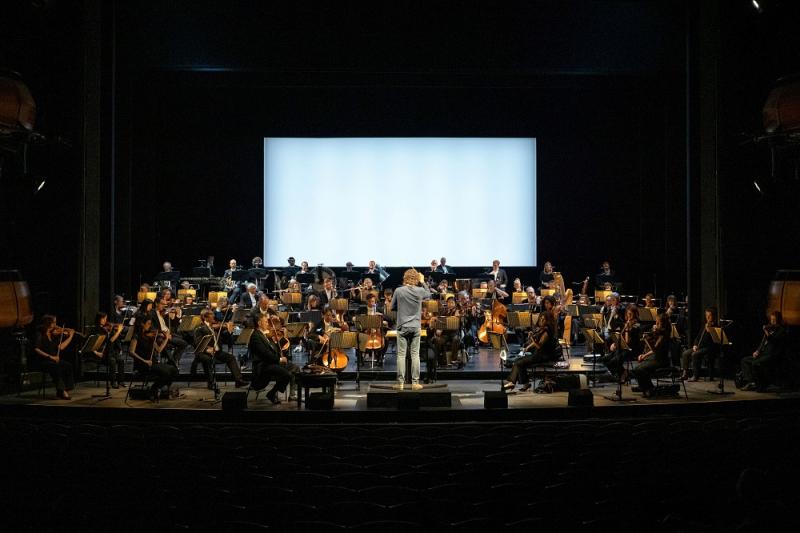
As the catastrophe unfolded in 2020, it seemed reasonable to speculate that the biggest orchestral works – Mahler and Shostakovich symphonies, Strauss tone poems among them – probably wouldn’t be heard live in our concert halls for years.
Yet see how adaptable and uncrushable our great performing artists are. Following four and a half months of mostly scaled-down or middle-range opuses streamed online, the London orchestras adapted with alacrity. Simon Rattle welcomed an audience back into the Barbican, wondering at “that sound you make with your hands” for a nicely-tailored London Symphony Orchestra programme starting with the miracle of Britten’s The Young Person’s Guide to the Orchestra, aka Variations and Fugue on a Theme of Purcell. Later we were stunned by the range of sounds viola player supreme Antoine Tamestit can make in Walton’s Violin Concerto, (the soloist pictured below by Mark Allen with some of the players) followed by a fascinating interpretation of Brahms’s Fourth Symphony (even better, I’m told, in the Barbican after a short tour than in LSO St Luke’s, where I heard this invigorating double bill). 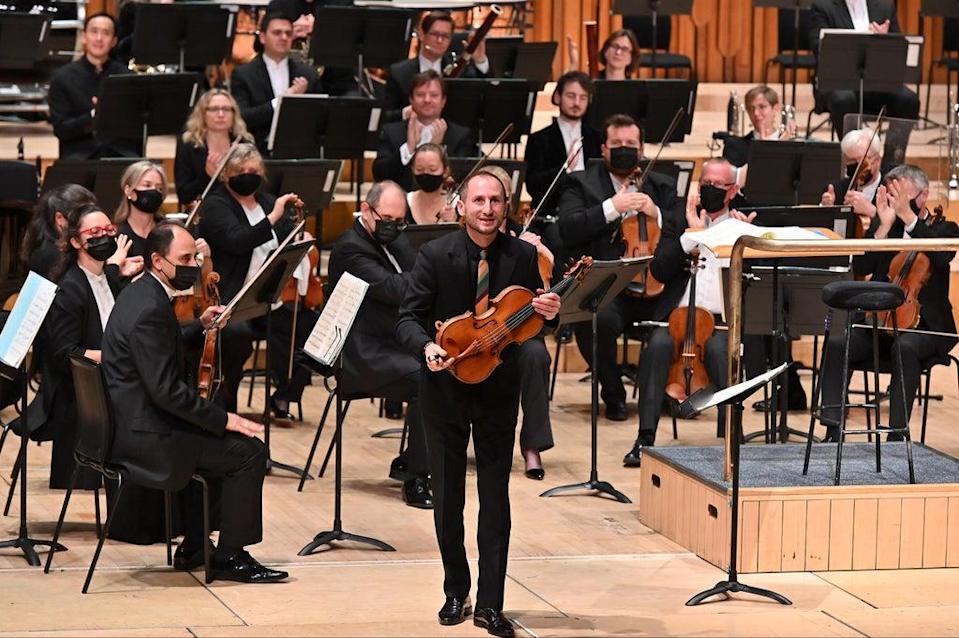 Ticciati had the bold idea of making the London Philharmonic centre-stage at Glyndebourne, in very special programmes incorporating an element of theatricality: my first swoon of the year came in the performance there of Mahler’s Fourth Symphony after a first half of Purcell, Birtwistle and Vaughan Williams. Boyd Tonkin was lucky to be at the LPO’s end-of-year flourish on the South Bank, the revelation of James MacMilan’s new Christmas Oratorio. “I still don’t quite know how MacMillan – who scavenges so gleefully across six centuries of the musical past – avoids mere high-grade pastiche. But the Oratorio, gloriously performed by the LPO and its Choir under Mark Elder with soloists Lucy Crowe and Roderick Williams, made me deeply grateful for his own mysterious gifts.”
Ticciati had the bold idea of making the London Philharmonic centre-stage at Glyndebourne, in very special programmes incorporating an element of theatricality: my first swoon of the year came in the performance there of Mahler’s Fourth Symphony after a first half of Purcell, Birtwistle and Vaughan Williams. Boyd Tonkin was lucky to be at the LPO’s end-of-year flourish on the South Bank, the revelation of James MacMilan’s new Christmas Oratorio. “I still don’t quite know how MacMillan – who scavenges so gleefully across six centuries of the musical past – avoids mere high-grade pastiche. But the Oratorio, gloriously performed by the LPO and its Choir under Mark Elder with soloists Lucy Crowe and Roderick Williams, made me deeply grateful for his own mysterious gifts.”
The biggest statement of all came at the start of the Philharmonia’s 2021-2 season in the Royal Festival Hall. It was crazy of the chief conductor the players seem to love, Finn Santtu-Matias Rouvali, to offer two Richard Strauss extravaganzas in one programme. The Also sprach Zarathustra only really sprang out of the impersonal with the duetting of the orchestra’s two leaders on the front desk, Zsolt-Tihamér Vistontay and Benjamin Marquise Gilmore, in the high jinks of the waltzing Superman. An Alpine Symphony was vivid from first to last, even with the horns across the valley actually accommodated within the hall; that brought the number of players in front of us and to one side to 134 (by no mens the full complement pictured below by Mark Allan). 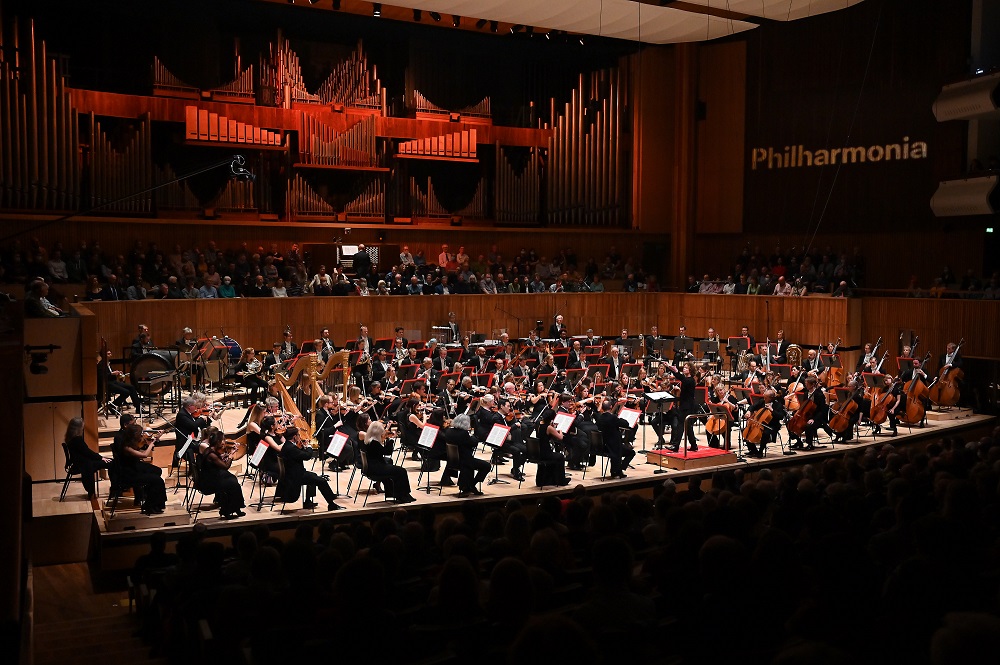
The end of what would have been the previous Philharmonia season saw a farewell to Rouvali’s questing predecessor, Esa-Pekka Salonen, and two concerts emblematic of his original programming over the years; the first worked even better than the second.” For me, the most sumptuous and electrifying orchestral concert of the year came from John Wilson’s hand-picked Sinfonia of London at Snape Maltings, rising to two British masterpieces of international brilliance, Britten’s Piano Concerto (with the ever-unpredictable Pavel Kolesnikov) and Vaughan Williams’s A London Symphony. Richard Bratby loved their Prom, “the verve, the finesse, the endlessly expressive voicing and phrasing - all topped off with probably the greatest live performance of the Korngold Symphony that anyone present will ever have heard….it felt like being in love”. 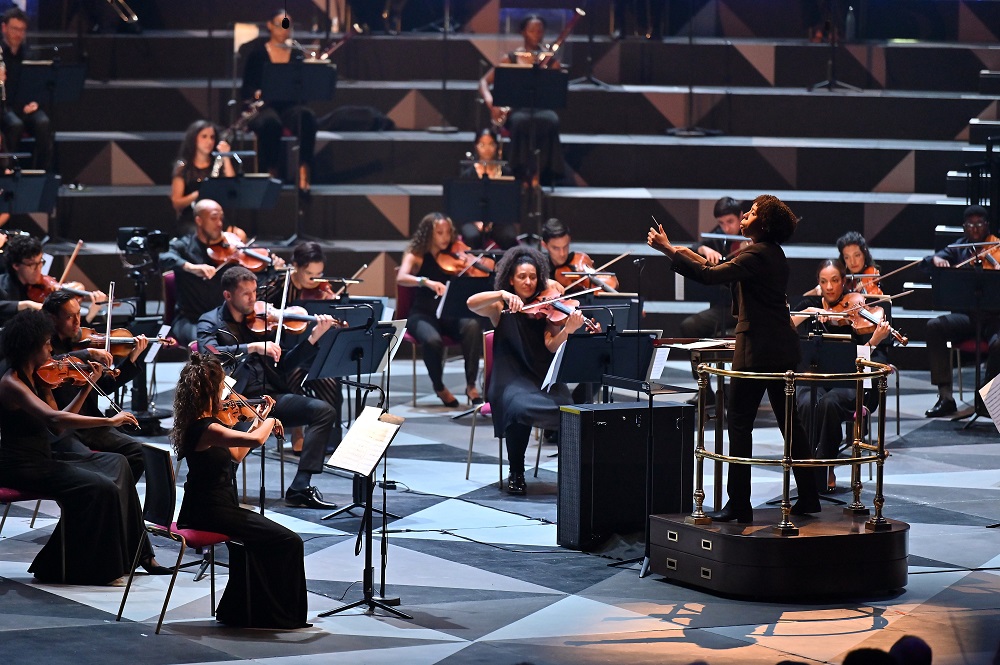 I felt proud and happy that the first three Proms I attended all happened to be shaped by first-rate women conductors: the most vivid of Sibelius Second Symphonies in a fascinating interpretation by yet another Finn, Dalia Stasevska – don’t be surprised when the country’s training programme puts conductors in front of full orchestras from an early age; Samuel Coleridge-Taylor's deliciously individual Symphony sounding sleek and chameleonic from Chineke! Players under Panamian American Kalena Bovell (pictured above by Robert Allan); and the annual visit – it will be her last as chief conductor of the City of Birmingham Symphony Orchestra - from Mirga Gražinytė-Tyla. This, as it happened, culminated in the first disappointment I’ve experienced from this team live, an uncertain Brahms Third Symphony. I have to slip in a word of praise for Catherine Larsen-Maguire’s debut with the LPO down in Eastbourne with a translucent, supple Brahms Two, absolutely fresh and much praised by Ian.
I felt proud and happy that the first three Proms I attended all happened to be shaped by first-rate women conductors: the most vivid of Sibelius Second Symphonies in a fascinating interpretation by yet another Finn, Dalia Stasevska – don’t be surprised when the country’s training programme puts conductors in front of full orchestras from an early age; Samuel Coleridge-Taylor's deliciously individual Symphony sounding sleek and chameleonic from Chineke! Players under Panamian American Kalena Bovell (pictured above by Robert Allan); and the annual visit – it will be her last as chief conductor of the City of Birmingham Symphony Orchestra - from Mirga Gražinytė-Tyla. This, as it happened, culminated in the first disappointment I’ve experienced from this team live, an uncertain Brahms Third Symphony. I have to slip in a word of praise for Catherine Larsen-Maguire’s debut with the LPO down in Eastbourne with a translucent, supple Brahms Two, absolutely fresh and much praised by Ian.
For Sebastian Scotney, the joy of returning to live music making was best summed up by "Patricia Kopatchinskaja lunging towards BBC Scottish Symphony Orchestra leader Laura Samuel to invite her to start an encore at the "Bartók Roots" Prom, Ligeti's violin duet Baladă și Joc (ballad and dance)". No surprise, perhaps, that another favourite Prom, this time Boyd’s second choice, happened to be Bach and Handel delivered by John Eliot Gardiner, his Monteverdi Choir and English Baroque Soloists. Alexandra Coghlan loved their Bach St John Passion, on film only from Oxford’s Sheldonian Theatre. I had problems with the relative pallor of some of the soloists, especially alongside the lustre of a classy Stockholm line-up, but I agree totally with Alexandra about the vividness of the from-memory singing and the utterly original Evangelist of Nick Pritchard. 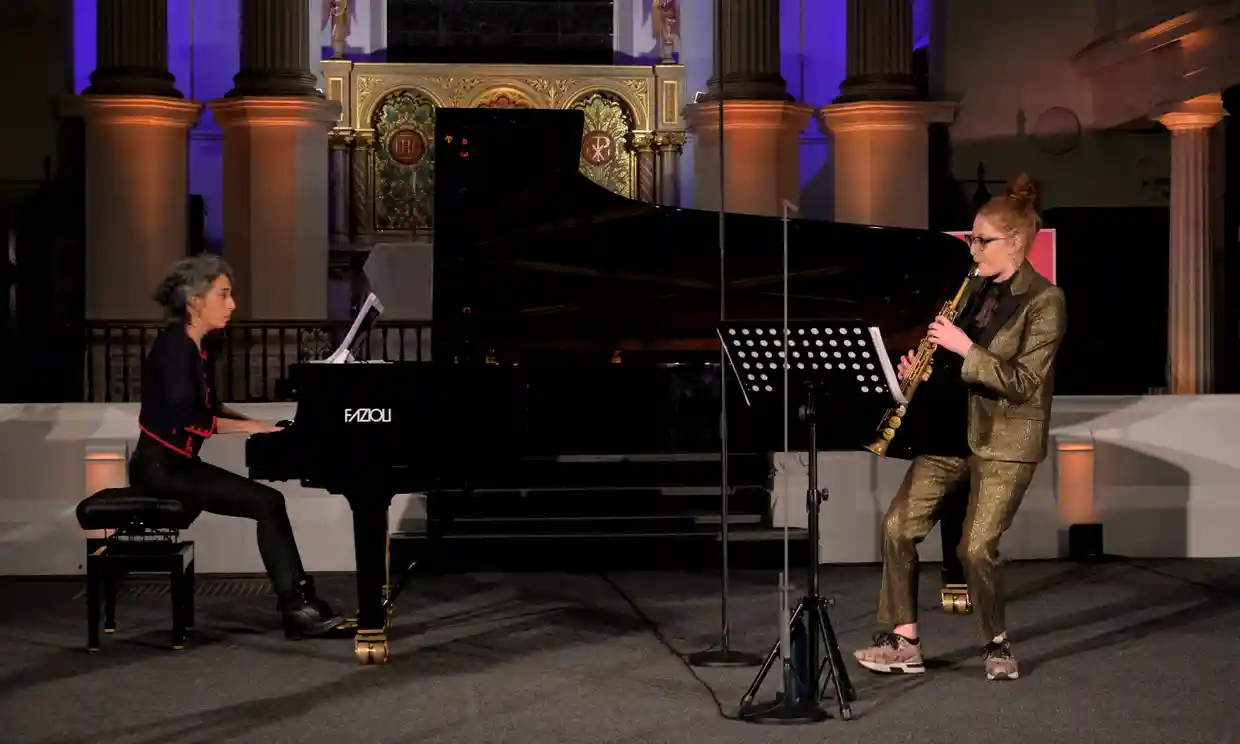 Alexandra’s second choice is also a pre-liberation digital one, saxophonist Jess Gillam communicating across the board with style and verve as part of the excellent Classical Vauxhall Festival (Gillam pictured above by Neil Massey with pianist Zeynep Özsuca). We’re banking on the live experience in February 2022; the line-up is similarly good. Many of the smaller-scale festivals did manage to get off the ground; Miranda Heggie experienced some Ryedale Festival events live in Yorkshire but also praises the digital enterprise of RyeStream, “which comprises a range of filmed performances interspersed with visuals of Rydeale's stunning surroundings and is definitely in the upper tranche of digital output seen this year.”
Alexandra’s second choice is also a pre-liberation digital one, saxophonist Jess Gillam communicating across the board with style and verve as part of the excellent Classical Vauxhall Festival (Gillam pictured above by Neil Massey with pianist Zeynep Özsuca). We’re banking on the live experience in February 2022; the line-up is similarly good. Many of the smaller-scale festivals did manage to get off the ground; Miranda Heggie experienced some Ryedale Festival events live in Yorkshire but also praises the digital enterprise of RyeStream, “which comprises a range of filmed performances interspersed with visuals of Rydeale's stunning surroundings and is definitely in the upper tranche of digital output seen this year.”
For the first time in seven years, hospital visiting kept me from my favourite festival in the world, showcasing Paavo Järvi's superband the Estonian Festival Orchestra in the blissful seaside town of Pärnu, but all concerts are still available to view for free on the website, and still give a frisson, especially Lars Vogt's Mozart, Joshua Bell's Dvořák and the revelation of just how wonderful the Swedsh composer Berwald can be in the closing performance of his Fourth Symphony (Sinfonie naïve'). The encores are terrific, as always.
Bernard Hughes has chosen two events of deep significance. The first was again online, Re-wilding The Waste Land, Tamsin Greig performing extracts from The Waste Land alongside I Fagiolini’s beautifully judged programme of mainly contemporary pieces celebrating the natural world. Never to Forget, Howard Goodall’s tribute to care workers killed by Covid – “a choral setting of all their names, that was extremely moving and a suitable living monument to the dead”. A happier, and serendipitous, farewell came to the Estonian composer Ester Mägi in what turned out to be the week before her death at the age of 99. The Sea is a little masterpiece, performed superbly by the Northern Chords Festival Orchestra under Jonathan Bloxham – an army of young generals from quartets and orchestras all over the UK – in the annual Europe Day Concert in St John's Smith Square, reviewed for theartsdesk by Jessica. The film of the entire concert, a fine piece of work, is still online, but here’s just the Mägi.
Opening up in Scotland was much more cautious, but the artists at the superlative East Neuk Festival, all performing this year in the big, acoustically tricky space of the Bowhouse, which allows distancing of the audience, could not have been stronger. It all began with a bang as Samson Tsoy plunged into the dissonant parody of Tchaikovsky’s First Piano Concerto to launch a sequence of Kurtág’s Játékok (Games). The revelation for me was Fanny Mendelssohn’s E flat String Quartet, which the wonderful Castalian Quartet placed after Felix’s grief-stricken Sixth; it’s tough, but brilliant. The Mendelssohn sister has to be the best of all 19th century women composers; how shameful that her talent couldn’t thrive even more.
At the Two Moors Festival’s first (Dartmoor) weekend, I heard for the first time the pianist George Xiaoyuan Fu (pictured below by Clive Barda) in a beautifully sequenced programme of bird music – for me young artist of the year, though the now well-estabilished Tsoy and Kolesnikov brought our their third cornucopia of great chamber-musical performances at the Ragged School in London’s East End as soon as such things were possible. Another quirky venue favoured by the two pianists and partners, the Peckham Multi-Storey Car Park performance space managed by Bold Tendencies, took on its biggest venture yet - the two Brahms piano concertos magisterially handled by Tsoy with Maxim Emelyanychev conducting a full (and first rate) Philharmonia Orchestra. Bold Tendencies' commitment to vital community epics yielded a magnificent performance of Kate Whitley's eco-cantata Our Future in Your Hands including a lusty chorus of 97 Peckham schoolchildren - another spectacular one didn't expect to witness in 2021.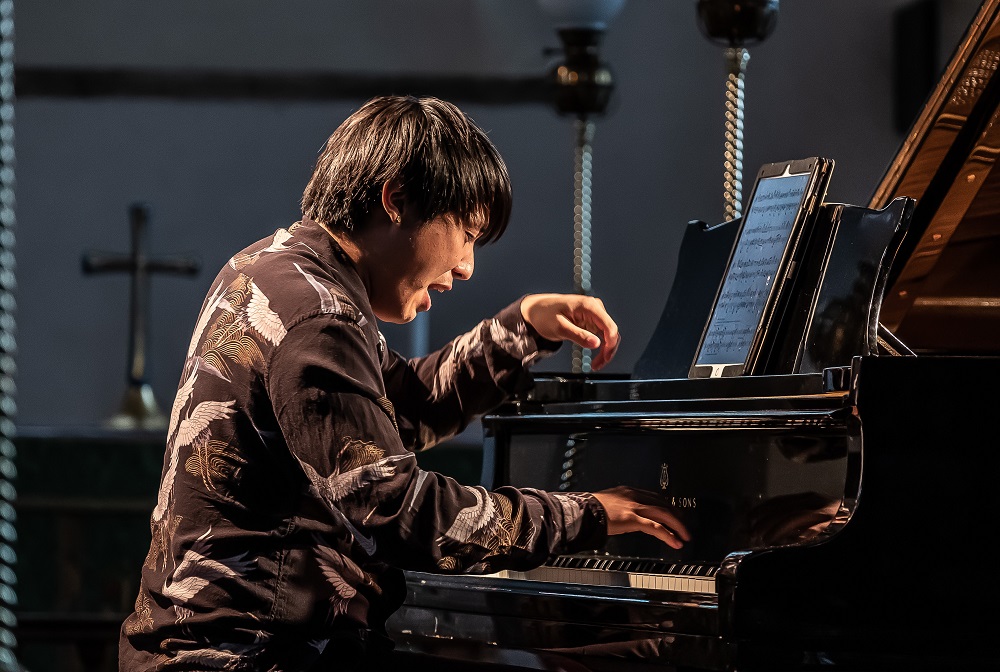 As usual, it’s hard to choose from the wealth of great performances the Wigmore Hall has continued to support, but I was mesmerised as always by guitarist Sean Shibe in an enchanted May lunchtime hour and knocked sideways by the supremely cultured quick-change artistry of Czechia’s Smetana Piano Trio. We know from experience that this hall can exercise the finest caution in the face of rising infections; all measures have to be taken to make sure venues can carry on as before. They’re managing it in Spain and Italy, to name but two countries, so it can be done in the UK too – but it takes decisive leadership.
As usual, it’s hard to choose from the wealth of great performances the Wigmore Hall has continued to support, but I was mesmerised as always by guitarist Sean Shibe in an enchanted May lunchtime hour and knocked sideways by the supremely cultured quick-change artistry of Czechia’s Smetana Piano Trio. We know from experience that this hall can exercise the finest caution in the face of rising infections; all measures have to be taken to make sure venues can carry on as before. They’re managing it in Spain and Italy, to name but two countries, so it can be done in the UK too – but it takes decisive leadership.
Explore topics
Share this article
The future of Arts Journalism
You can stop theartsdesk.com closing!
We urgently need financing to survive. Our fundraising drive has thus far raised £49,000 but we need to reach £100,000 or we will be forced to close. Please contribute here: https://gofund.me/c3f6033d
And if you can forward this information to anyone who might assist, we’d be grateful.

Subscribe to theartsdesk.com
Thank you for continuing to read our work on theartsdesk.com. For unlimited access to every article in its entirety, including our archive of more than 15,000 pieces, we're asking for £5 per month or £40 per year. We feel it's a very good deal, and hope you do too.
To take a subscription now simply click here.
And if you're looking for that extra gift for a friend or family member, why not treat them to a theartsdesk.com gift subscription?
more Classical music
 From Historical to Hip-Hop, Classically Black Music Festival, Kings Place review - a cluster of impressive stars for the future
From quasi-Mozartian elegance to the gritty humour of a kitchen inspection
From Historical to Hip-Hop, Classically Black Music Festival, Kings Place review - a cluster of impressive stars for the future
From quasi-Mozartian elegance to the gritty humour of a kitchen inspection
 Shibe, LSO, Adès, Barbican review - gaudy and glorious new music alongside serene Sibelius
Adès’s passion makes persuasive case for the music he loves, both new and old
Shibe, LSO, Adès, Barbican review - gaudy and glorious new music alongside serene Sibelius
Adès’s passion makes persuasive case for the music he loves, both new and old
 Anja Mittermüller, Richard Fu, Wigmore Hall review - a glorious hall debut
The Austrian mezzo shines - at the age of 22
Anja Mittermüller, Richard Fu, Wigmore Hall review - a glorious hall debut
The Austrian mezzo shines - at the age of 22
 First Person: clarinettist Oliver Pashley on the new horizons of The Hermes Experiment's latest album
Compositions by members of this unusual quartet feature for the first time
First Person: clarinettist Oliver Pashley on the new horizons of The Hermes Experiment's latest album
Compositions by members of this unusual quartet feature for the first time
 Gesualdo Passione, Les Arts Florissants, Amala Dior Company, Barbican review - inspired collaboration excavates the music's humanity
At times it was like watching an anarchic religious procession
Gesualdo Passione, Les Arts Florissants, Amala Dior Company, Barbican review - inspired collaboration excavates the music's humanity
At times it was like watching an anarchic religious procession
 Classical CDs: Camels, concrete and cabaret
An influential American composer's 90th birthday box, plus British piano concertos and a father-and-son duo
Classical CDs: Camels, concrete and cabaret
An influential American composer's 90th birthday box, plus British piano concertos and a father-and-son duo
 Cockerham, Manchester Camerata, Sheen, Martin Harris Centre, Manchester review - re-enacting the dawn of modernism
Two UK premieres added to three miniatures from a seminal event of January 1914
Cockerham, Manchester Camerata, Sheen, Martin Harris Centre, Manchester review - re-enacting the dawn of modernism
Two UK premieres added to three miniatures from a seminal event of January 1914
 Kempf, Brno Philharmonic, Davies, Bridgewater Hall, Manchester review - European tradition meets American jazz
Bouncing Czechs enjoy their Gershwin and Brubeck alongside Janáček and Dvořák
Kempf, Brno Philharmonic, Davies, Bridgewater Hall, Manchester review - European tradition meets American jazz
Bouncing Czechs enjoy their Gershwin and Brubeck alongside Janáček and Dvořák
 Solomon, OAE, Butt, QEH review - daft Biblical whitewashing with great choruses
Even a top soprano and mezzo can’t make this Handel paean wholly convincing
Solomon, OAE, Butt, QEH review - daft Biblical whitewashing with great choruses
Even a top soprano and mezzo can’t make this Handel paean wholly convincing
 Two-Piano Gala, Kings Place review - shining constellations
London Piano Festival curators and illustrious friends entertain and enlighten
Two-Piano Gala, Kings Place review - shining constellations
London Piano Festival curators and illustrious friends entertain and enlighten
 Echo Vocal Ensemble, Latto, Union Chapel review - eclectic choral programme garlanded with dance
Beautiful singing at the heart of an imaginative and stylistically varied concert
Echo Vocal Ensemble, Latto, Union Chapel review - eclectic choral programme garlanded with dance
Beautiful singing at the heart of an imaginative and stylistically varied concert
 Scott, Irish Baroque Orchestra, Whelan, RIAM, Dublin review - towards a Mozart masterpiece
Characteristic joy and enlightenment from this team, but a valveless horn brings problems
Scott, Irish Baroque Orchestra, Whelan, RIAM, Dublin review - towards a Mozart masterpiece
Characteristic joy and enlightenment from this team, but a valveless horn brings problems

Add comment